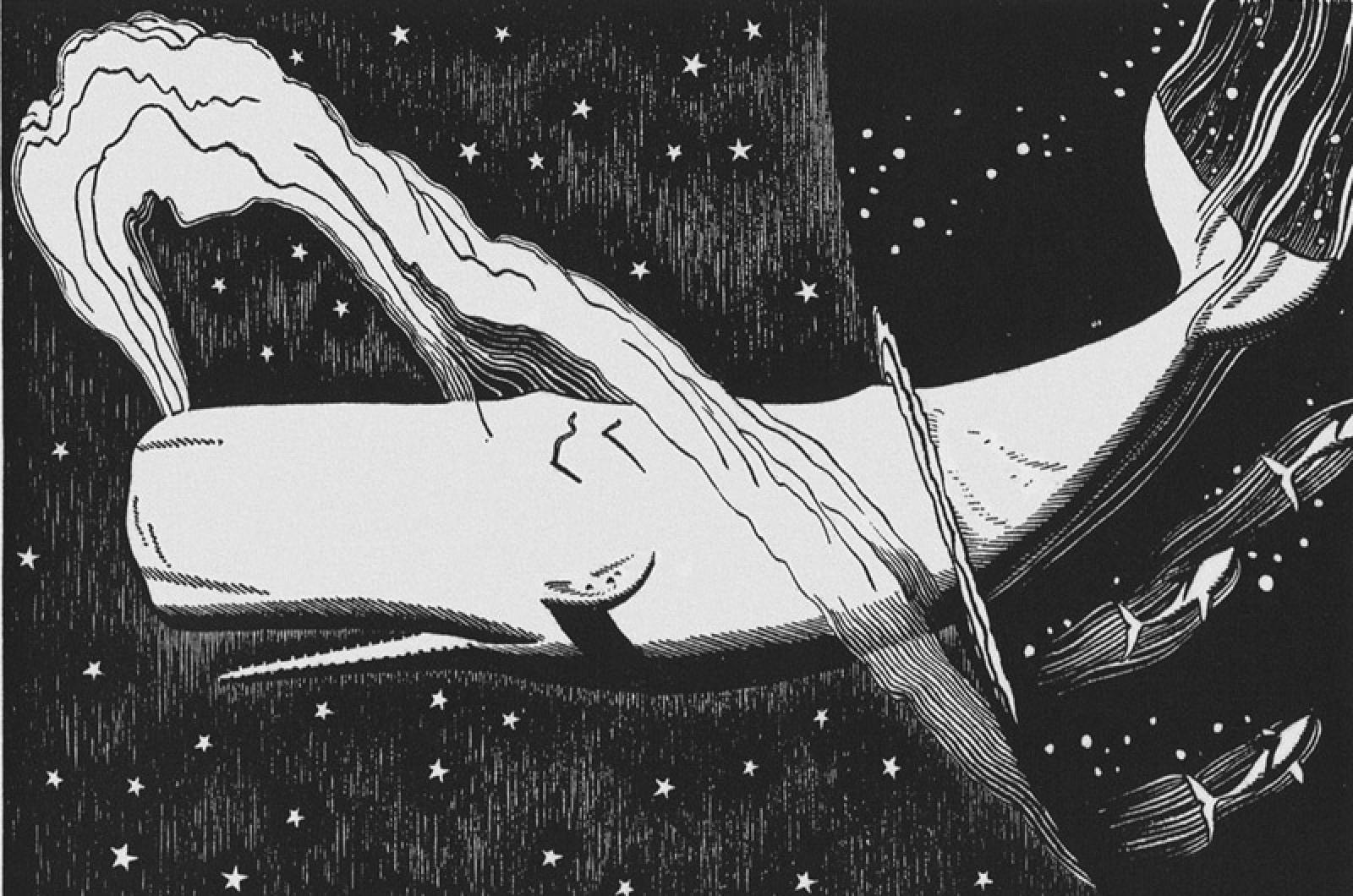I first read Moby Dick in a college literature course focused on Melville, Twain, James and Faulkner. Many big books there, but the outstanding one was Moby Dick. It wasn’t like anything else I had read, not even like Melville’s other (haunting) work, Bartleby, Benito Cereno, The Confidence Man and Billy Budd. Twenty-five years later, now a professor myself, I taught Moby Dick in a comparative literature seminar at Swarthmore College. Surrounded by War and Peace, Middlemarch and The Magic Mountain, it didn’t seem that big. Within a few years, however, my interests shifted to modernism and postcolonialism. For the next 15 years I paid no attention to Melville. Finally, retired and teaching only for the pleasure of it (here on the Vineyard), I decided to return to Melville’s big book. Not because it has long enjoyed a central place in the canon, but because this Island — like Nantucket — likes to claim a special bond with the book. We’ve attended here to Faulkner, Tolstoy and Dostoevsky; time now for Melville.
I was not prepared for what I (re)encountered. Moby Dick is really unlike any other book I know. (I used to think that such a really was reserved for Joyce’s Ulysses.) It is not a novel. Yes, Tolstoy says the same thing about War and Peace, but War and Peace is nevertheless a novel, just the longest one you are likely to encounter. But Moby Dick isn’t fiction as we typically experience it: a narrative grounded in compelling characters and a complexly fulfilling plot. Not that Moby Dick lacks characters, nor that we have trouble gleaning its plot. Everyone knows, long before they pick it up (thanks to Jaws and other pop-cultural texts), that it centers on Ahab and the white whale, and that Ahab is going down big time. We already know that; it’s not why we read the book.
In another novel, if a young white man (named Ishmael) met and befriended a young pagan cannibal (named Queequeg) — and together they joined a whaling ship captained by a madman (named Ahab) — we can anticipate what would follow. Ishmael and Queequeg would become close friends (discovering more and more about each other), and they might or might not prevent Ahab’s obsessive quest to kill the white whale. That’s the story we’d expect to find, just as — in a different key — when a white boy (named Huck) joins a black slave (named Jim), we expect to find what Mark Twain gives us in Huckleberry Finn: the story of an interracial friendship, everywhere at odds with a world premised on the institution of slavery. But Ishmael and Queequeg do not become closer friends, and no one labors to prevent Ahab’s mad quest to kill the white whale. So what is Moby Dick really about?
We will spend many hours together, in September, trying to answer this question. It would be unwise (not to mention foolish) for me to try to do so here. But I can point you toward some enlightenment, by quoting this passage from the first chapter of Moby Dick:
“Say you are in the country; in some high land of lakes. Take almost any path you please, and ten to one it carries you down in a lake, and leaves you there by a pool in the stream. There is magic in it. Let the most absent-minded of men be plunged in his deepest reveries — stand that man on his legs, set his feet a-going, and he will infallibly lead you to water, if water there be in all that region. Should you ever be athirst in the great American desert, try this experiment, if your caravan happen to be supplied with a metaphysical professor. Yes, as everyone knows, meditation and water are forever wedded.”
Although ostensibly spoken by Ishmael, this passage doesn’t develop his character; it doesn’t tell us anything about him that the plot will later draw on. The passage isn’t plot driven at all. Rather, entitled “Loomings,” the chapter and the passage are about exactly that. Looming: a visual term synonymous with appearing, coming into view, taking shape, with a darker overtone of impending, threatening, brewing. That is the range of uncertain activities proposed by the passage. The agent invoked for such activities is not Ishmael — nor Queequeg nor Ahab nor anyone else on the Pequod. It is “you” — you being transported imaginatively to “some high land of lakes,” you who may take any path you please, yet you will end up near water. “There is magic in it.” Melville makes the pronoun “you” elastic, accommodating absent-mindedness, even likened to a metaphysical professor. What “you” all share is one unfailing trait: to be mesmerized by water. It is not like land.
Moby Dick is about looming. It takes you, its reader, on unsurpassable journeys — ostensibly in space but really in the mind. To read it is to exercise your imagination, and as we all know (especially as we grow older), exercise can be tiring. But such rewards! The magic trips in the book aren’t those of Ishmael or Queequeg or Ahab, but rather the ones you take as reader.
Philip Weinstein is the Alexander Griswold Cummins professor emeritus of literature at Swarthmore College. He lives in Aquinnah. Beginning Sept. 7 he will lead a six-part workshop titled American Baroque, which will include three sessions on Moby Dick and three sessions on Absalom, Absalom by William Faulkner. Sponsored by the Vineyard Haven Library, the classes will take place at the Katharine Cornell Theatre.




Comments (4)
Comments
Comment policy »